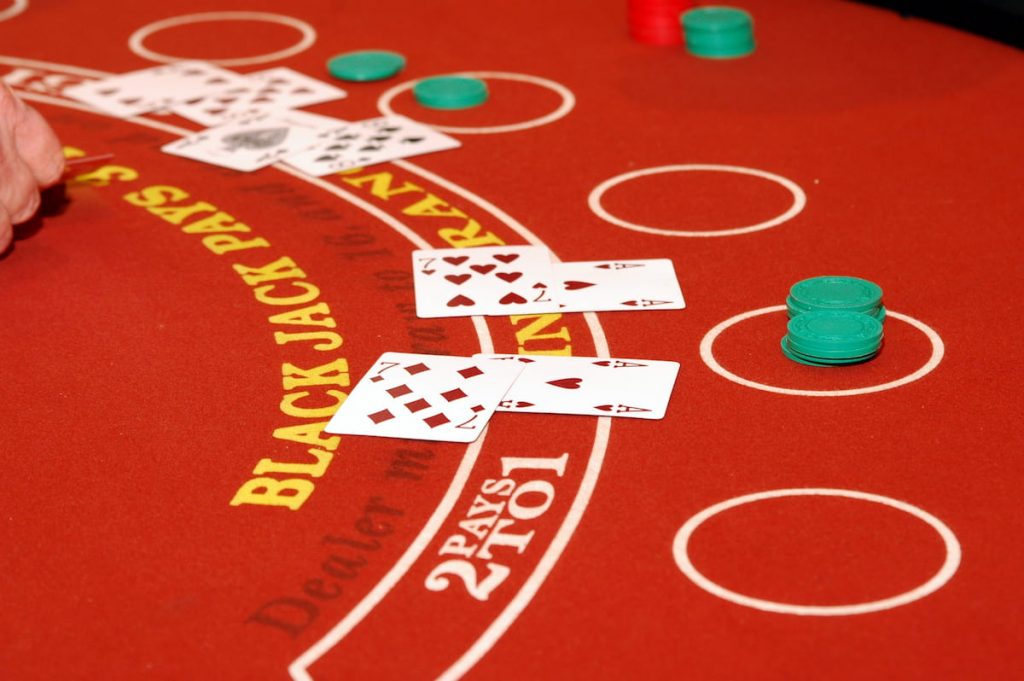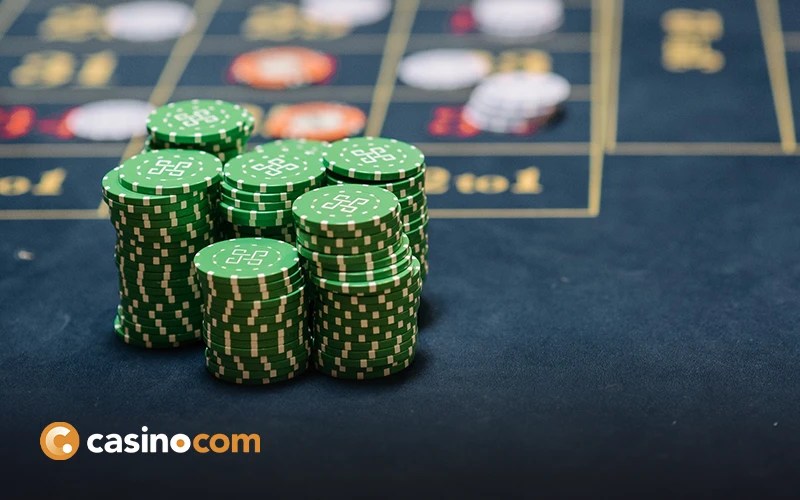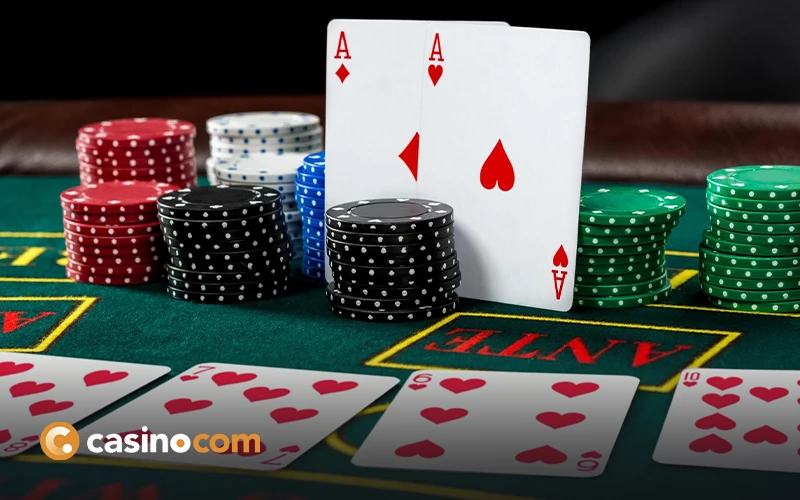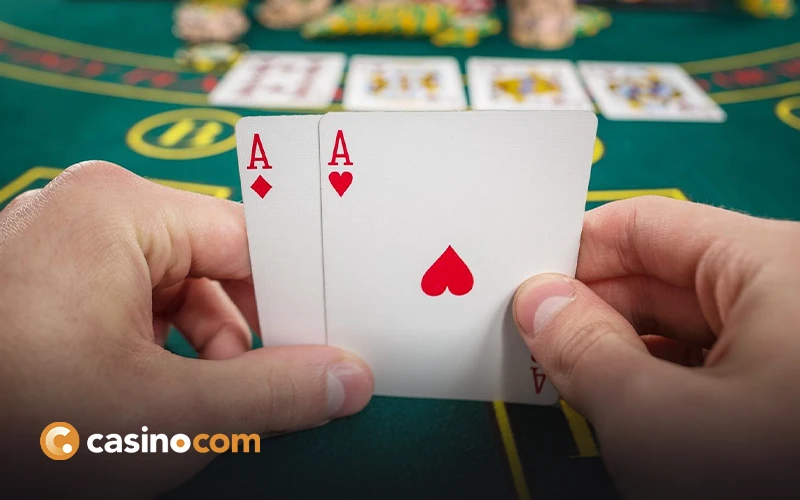Stephen Tabone is an expert on casino systems play and author of a number of books on gambling. He shares his advice on when to double down at the Blackjack table exclusively with the Casino.com Blog.
Blackjack players find that doubling down is one of the most appealing actions to make because it allows them to double their initial wager and offers the chance to win additional money.
You can use a standard playing strategy to decide whether or not to double down, meaning that blackjack hand value charts often hold the answer.
In this guide, I’ll provide some key details about exactly when you should double down. Equally importantly, you’ll also discover when not to make this move.
What Does it Mean to Double Down?
After receiving your initial two cards in blackjack, you have a decision to make about whether you want to double down or not. This means that you can double your stake and maximize your potential returns from a hand. There is a general agreement among professional players about when you should double down in blackjack, and I’ll outline that in this guide.
It’s important to note that if you do decide to double down, you’ll only receive one additional card. You must then stand on that total. Therefore, you don’t want to be doubling down in situations where you may require two extra cards to make a winning hand.
When Should You Double Down?
There are various schools of thought about when you should double down in blackjack. It often differs depending on the variant you are playing and the rules of that strain. I recommend making sure you read the game description carefully, so you know how the dealer acts in any scenario.
When You Have 11
If there is a time to double down, this is going to be it. It is one of the most popular opportunities within blackjack for doubling down. The reason being is that you stand a much better chance of getting blackjack or at least close to it.
There is also a better chance that you won’t break 21, giving you a bit of an edge. The vast majority of players are going to want to double down when they have 11 showing right off the bat.
With a Hard 9 or 10
In blackjack, a “hard” hand refers to one where there isn’t an ace in play. Should you find yourself with a hard 9 or 10, it’s still a pretty good opportunity to double down. That is so long as the dealer is showing a lower card. It might not work out quite as often as it would when showing an 11 but you’ll be in a pretty good situation to come out a winner against the dealer.
When You Show a Soft 16, 17, or 18
When it comes to “soft” hands in blackjack, it means that you have an ace in play in addition to another card. When playing blackjack, it’s common knowledge that having an ace can be a great thing because you have better chances of getting closer to 21. That said, don’t get too confident. The rule of thumb is to only double down if the dealer is showing a lower card in this situation.
Our blackjack strategy chart shows you the best times to double down and when to avoid:
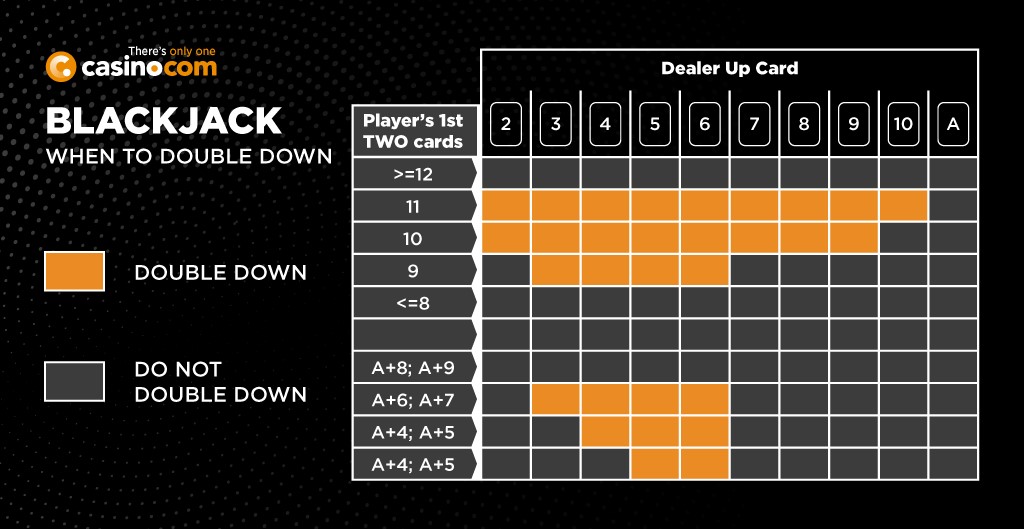
The General Strategy
Most would agree that the best time to double down in blackjack is when you have a hard 11 or a 10 with a 9, 10, or 11. Generally speaking, the best situations in which to double down are when you have 11 and the dealer has any card other than an A or 10 when you have 10 and the dealer is showing a card between 2 and 9, or if you have a 9 and the dealer has anything between 3 and 6.
These situations give you a greater probability of winning, meaning that doubling down increases your chances of making a significant return from your stake. Other hands-on which you should double down consistently include hard 8 or hard 9 if the dealer is showing an upcard between 3 and 6.
Differing Rulesets
It’s important to be wary of different rulesets in diverse variants of blackjack, as sometimes doubling down is not an optimal play in these. Indeed, in some blackjack variants, the rules for doubling down may be more favourable to the player. In others, they may be more favourable to the dealer.
For example, in some variants, you are allowed to double down on any initial two-card hand. However, other strains of the game may only allow you to double down under certain conditions such as if your initial two cards total 9, 10, or 11.
When Should You Not Double Down?
While there are some notable times when doubling down is a recommended move, there are also situations when you should avoid this play. You need to be aware of these occasions as well, because otherwise you may be tempted to double down at less-than-optimal times.
You should not double down if you have a hard 12 up to a hard 16 and the dealer has an 8 or higher. Likewise, avoid doubling down if you have a soft 18 unless the dealer has a 9, 10, or ace. Also, it is generally unwise to double down if you have a hard 17 or higher when the dealer has a card between 8 and 10 or an ace.
Hard 12-16
You should not double down if you have a hard 12 up to a hard 16 and the dealer has an 8 or higher. Likewise, avoid doubling down if you have a soft 18 unless the dealer has a 9, 10, or ace. Also, it is generally unwise to double down if you have a hard 17 or higher when the dealer has a card between 8 and 10 or an ace.
If the Dealer is Showing an Ace
Having an ace on either side is a powerful thing. If you see that the dealer is showing an ace, never, ever double down. The odds are definitely in their favor to either pull blackjack or get quite close to 21.
If Your Hand is Hard and Above 11
Having a hard hand that’s higher than an 11 is a tough spot. The chances are pretty good that you’re going to bust, so doubling down doesn’t make a lot of sense. When in doubt, stay away from doubling down because doing so incorrectly can wind up costing you in the long run.
A Few Basic Blackjack Tips for Doubling Down
A few extra tips and tricks will go a long way toward turning you into a winner over several hands. Check these out:
- Should you be ready to take a risk, you can signal your double down to the dealer by pushing the same amount as your initial bet next to the first stack. Don’t put new chips on top of the initial amount because it can be interpreted as tampering with the bet. A double down always has to match your initial amount.
- Just about anywhere, you aren’t going to be able to double down after you split your hand. Most of the time, players will split a pair and get two new cards, one for each “hand.” There are a handful of casinos that allow a double down after splitting but they are few and far between.
- If you are newer to the game, make it a rule to double down whenever you show an 11. You might change your tune later on but it’s a good basic rule to adhere to.
- After you hit, the chance to double down is gone. For the most part, you can only double down after the dealer has dealt your two cards.
Practice Doubling Down Today
If you want to get the hang of doubling down in blackjack, we recommend that you begin by playing with low stakes until you are clear on the strategy. There are plenty of websites across the web where you can practice with low stakes or for free.

